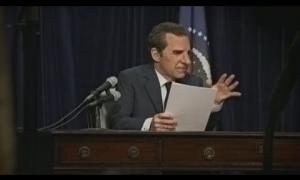The tragicomic state of the state-of-the-village address
February 10, 2010
This article originally appeared on the Huffington Post. —Ed.
By David Murray, editor, Vital Speeches of the Day
It’s no accident that the relatively new trend of the splashy January state-of-the-village address was born and burgeoned during the housing boom. Back then—in the 1990s and 2000s, mayors wanted to get up and tout all the new housing starts and retail openings.
In those heady days, the state of the village was good and so the speech amounted to a campaign pitch for the mayor.
But now the damned thing is an institution that the mayors can’t duck–even though, this year, they must have wanted to.
In his 9th annual state-of-the-city address in January, New York Mayor Michael Bloomberg employed several power-packed rhetorical devices in thundering, “Can we centralize some of our human resource functions? And information technology resources? And payment and billing systems? I think the answer is yes.”
Down, you goose bumps!
Chicago mayor Richard Daley hadn’t been any more inspired, when he delivered his state of the city address, back in July (here in Chicago, the year starts when the mayor sez it starts). Daley urged Chicagoans to “remain confident and optimistic and continue to work together.”
Seeing that we weren’t feeling confident or optimistic or cooperative in the first place, the line fell pretty flat.
The small-town mayors were singing the same lame song. “I look forward to working with my fellow Commissioners,” said Jeff Longbine, mayor of Emporia, Ks., “to maintain services, manage the budget and continue to improve Emporia wherever possible.”
Maintain the Bastille!
Woodridge, Ill. mayor William Murphy declared the coming year would be focused on “our core services, maintaining roads and other infrastructure, keeping our community safe, and keeping costs down.”
Kind of like the functioning of a human being with moderate hypothermia.
Even Murphy’s state-of-the-village presentation was simplified, he said. “And yet, scaling back on the bells and whistles does not diminish the essence of the event; because Woodridge works when we work together.”
When you find yourself stringing five W-words together to make your claim, you know you’re straining awfully hard.
Mayor Mary Bossart said Rockville Centre, N.Y. couldn’t maintain its infrastructure without raising taxes. She drew inspiration from Daniel Webster when she added, “During this coming year, I will be asking the board members to use resiliency—the capacity to remain flexible and recover rapidly from unexpected challenges—as a guiding principle in our decision-making for the village.”
I’ve noticed that mayors talk less about “I” in hard times, and more about “we.”
“We know we have another challenging budget shortfall to overcome,” said Wilmington, N.C. mayor Bill Saffo. “This council will have difficult choices to face, but together I am confident we can continue to provide core services that our citizens expect and want.”
That would be need, Mayor. They are core services, after all.
Mayor John Stromberg was less euphemistic and more pragmatic: “With the world, to a certain extent, crumbling around us, and we being affected as well, I would argue we, as a community, are pursuing the following strategy,” he said. “Take full advantage of the old economy as long as it lasts but use this time to develop a new community and new culture that is in harmony with the world in which we live.”
He’s an old hippie, and he knows just what to do. Keep one foot in the past and another one in the new …
Perhaps the most valiant attempt at rhetorical sow’s ear/silk purse conversion came from Indianapolis mayor Greg Ballard, who acknowledged his “vision” amounted to little more than maintaining “the basics expected by the citizens of their government.”
But then he added, “A big city that can get the ordinary things done right can be an extraordinary place to live.”
Churchill, it’s not.
Let’s hope better times are coming.
And happier state-of-the-village speeches, right behind.



